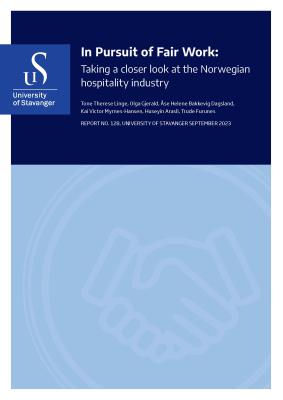In Pursuit of Fair Work: Taking a closer look at the Norwegian hospitality industry
Keywords:
hospitality industry, Covid-19 pandemic, fair work, fair work principles, hospitality workersSynopsis
This report highlights the findings and implications of research conducted in the Norwegian hospitality sector during the Covid-19 pandemic. The report focuses on workers’ experiences in the industry, using the Fair Work Principles: fair contracts, fair pay, fair conditions, fair management, and fair representation. Similar surveys have been conducted among hospitality workers in Ireland, Scotland, Greece, Australia, and New Zealand.
The Norwegian survey was conducted between September 2021 – March 2022 and generated 853 responses of which 585 were complete from workers in the Norwegian hospitality sector. The respondents varied in gender, age, nationality, role within the sector, contract type and length of service.
The results, based on the five key Fair Work Principles, show that the Norwegian hospitality sector still has some work to do to ensure that all workers in the industry experience fair work. Employees in the Norwegian worklife have a strong formal employment protection due to the Working Environment Act (Working Environment Act, 2005), in addition to other laws and regulations. Over 90 % of the participants reported that they were on permanent contracts, either full-time or part-time. However, although Norway has strong rules and regulations concerning employee rights, the survey reveals shortcomings concerning the greyer areas such as a lack of opportunities for pay rise or promotion, workplace training, not getting the rest breaks that workers are entitled to, and uncertainty whether the workers received the correct overtime pay.
Some of the most concerning findings in the Norwegian hospitality sector were related to fair conditions, where an alarmingly high number participants reported that they had either experienced or witnessed harassment, abuse and bullying in their workplaces. Most of the abuse came from customers, but many of the respondents also mentioned colleagues and supervisors/ managers as perpetrators of abuse, harassment and bullying. Furthermore, over 40 percent of those who stated that they had experienced or witnessed abuse, harassment or bullying in the workplace declared that they did not report it further due to different reasons such as that they did not know where to report, did not think that anything would be done, or that they were afraid of losing their job.
Concerning fair management, a third of the participants stated that they did not feel as though they were treated with dignity and respect, or that they received supportive feedback from their managers. Only half of the participants reported that they had received some kind of training in their job. The findings indicate that the types of training and development opportunities offered to employees were largely dependent on the specific workplace.
Ultimately, the findings highlight the following key areas for improvement in the Norwegian hospitality industry:
- Opportunities for pay rise and promotion
- Opportunities for training
- Cultural change: Working to change the industry specific culture of tolerating abuse and harassment among employees in the hospitality industry
- Management of staff: Increased respect and perceptions of being listened to and making a difference
References
Baum, T., Mooney, S.K.K., Robinson, R.N.S. and Solnet, D. (2020), "COVID-19's impact on the hospitality workforce - new crisis or amplification of the norm?", International Journal of Contemporary Hospitality Management, Vol. 32 No. 9, pp. 2813-2829.
https://doi.org/10.1108/IJCHM-04-2020-0314
Bergsli (2017, November 28). 5 spørsmål til forskeren: Ny minstelønn for bartendere, servitører og hotellansatte. Arbeidslivet.no. https://www.arbeidslivet.no/lonn/allmenngjoring/ny-minstelonn-forbartendere-servitorer-og-hotellansatte
Fair Work Convention (2023). The fair work framework. Retrieved from https://www.fairworkconvention.scot/the-fair-work-framework/ Accessed 29.03.2023
Fair Work Convention (2016) Fair Work Framework available online: https://www.fairworkconvention.scot/wp-content/uploads/2018/12/Fair-Work-Convention-Framework-PDF-Full-Version.pdf Accessed 29.03.2023
Fredman, S., du Toit, D., Graham, M., Howson, K., Heeks, R., van Belle, J., Mungai, P. & Osiki, A. (2020) Thinking Out of the Box: Fair Work for Platform Workers, King's Law Journal, 31:2, 236-249 https://fair.work/en/fw/principles/
https://doi.org/10.1080/09615768.2020.1794196
Gjerald, O., Dagsland, Å.H.B., & Furunes, T. (2021) 20 years of Nordic hospitality research: a review and future research agenda, Scandinavian Journal of Hospitality and Tourism, 21:1, 37-48
https://doi.org/10.1080/15022250.2021.1880058
Hadjisolomou, A., Booyes, I., Nickson, D. Cunningham, T. Baum, T. (2022). Fair work for all? A review of employment practices in the Scottish hospitality industry. Research report, University of Strathclyd Business School.
Jakobsen, E., Iversen, E. K., Nerdrum, L. & Rødal, M. (2021). Norsk reiseliv før, under og etter pandemien. Menon-publikasjon nr. 121.
Linge, T., Furunes, T., Baum, T. & Duncan, T. (2020). Hospitality through hospitableness: Offering a welcome to migrants through employment in the hospitality industry. In Walmsley, A., Åberg, K., Blinnikka, P. &
https://doi.org/10.1007/978-3-030-47813-1_19
Jóhannesson, G.T. (Eds.). Tourism employment in Nordic countries. Palgrave Macmillan s.401-424. DOI: 10.1007/978-3-030-47813-1
https://doi.org/10.1007/978-3-030-47813-1
NAV (2022). NAVs Bedriftsundersøking 2022 - Stor mangel på arbeidskraft (NAV Rapport 2/2022). Retrieved from https://www.nav.no/no/nav-og-samfunn/kunnskap/analyser-fra-nav/arbeid-og-velferd/arbeid-og-velferd/bedriftsundersokelsen
Robinson, R., Martins, A., Solnet, D. & Baum, T. (2019). Sustaining precarity: critically examining tourism and employment. Journal of Sustainable Tourism, 27(7), 1008-1025.
https://doi.org/10.1080/09669582.2018.1538230
Statistics Norway (2023). Employed persons per 4th quarter, by contents, type of appointment, sex, year, industry (SIC2007), and age, retrieved from https://www.ssb.no/en/statbank/sq/10078014
Winchenbach, A., Hanna, P. & Miller, G. (2019). Rethinking decent work: the value of dignity in tourism employment. Journal of Sustainable Tourism, 27(7), 1026-1043.
https://doi.org/10.1080/09669582.2019.1566346
Working Environment Act (2005). Act relating to working environment, working hours and employment protection, etc. (LOV-2005-06-17-62). Lovdata. https://lovdata.no/dokument/NLE/lov/2005-06-17-62 .


